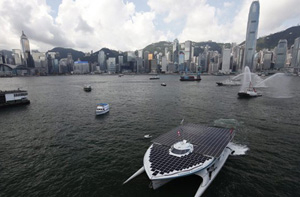Strategy built on decade of rapid growth
Updated: 2011-08-18 10:24
By Li Fangfang (China Daily)
|
|||||||||||
| ?
 File picture shows ABB logo on the roof of the Swiss engineering group's plant in Baden near Zurich July 22, 2009. [Photo/Agencies] |
BEIJING - Over 10 years, three presidents representing three nationalities have guided ABB China Ltd in stable but higher-than-market-speed development to dominate the local market from an unassailable leading position.
The three executives, while maintaining the same overall strategy, have advanced the Switzerland-based company with a focus that grew from "in China" to include "for China" and then "for the world".
Peter Leupp, who took the helm in 2001, finished his tenure in 2006 with the achievement of making China ABB's largest market in the world in terms of revenue.
Under his leadership, another milestone came in 2006 when the power and automation specialist became the first multinational company to move the global headquarters of one of its major businesses to China.
It said that relocating its robotics business headquarters from Detroit, Michigan, to Shanghai indicates that ABB is committed to helping Chinese manufacturers improve quality and productivity, two factors Leupp focused on.
In a previous interview with China Daily, he said "by transferring technology and know-how to China, we are helping to improve the overall skills base. We are working with our suppliers to ensure they meet our rigorous quality, health and safety standards."
When Brice Koch followed Leupp as president in January 2007, ABB kept a stable foothold in the Chinese market.
As the government included energy conservation in its 11th Five-Year Plan (2006-2010), with the goal of reducing energy consumption by 20 percent for each GDP unit by 2010 and the plan of investing $130 billion to double power transmission and distribution spending for more efficient networks and greater rural development, Koch made helping China meet its energy target the focus of ABB's strategy.
"China is one of the largest power markets by the number of consumers, with great energy-saving potential," he said. "The energy problem should not just be the concern of the public and government, but also should motivate enterprises to take action."
Under his leadership, ABB sought to promote power automation technologies to help industries in China "improve productivity, reliability and save energy".
His energy-efficiency-focused policy was greatly successful, even in 2009, when the world's economy was hit by the financial crisis.
"Tapping renewables and developing high-speed railways has become a pressing task to maintain the sustainable development of China's economy. With ABB's leading technologies in these areas, we hope to play an active role in bolstering the country's infrastructure construction," said Koch in a previous interview.
In 2009, ABB China's wind power business increased by more than 125 percent year-on-year, and its railway business in China more than tripled.
This posed challenges to Claudio Facchin, the youngest of the three, when he succeeded Koch 20 months ago.
"Peter and Brice did an excellent job in bringing ABB China from a corporation worth a few hundreds of million dollars to more than $4 billion. That's a huge achievement," Facchin said.
"Now we need to take the next step, to develop ABB China from a leading player in the domestic market to a major power in the global market," he said.
ABB China's 2010 financial results reflect Facchin's efforts to bring the company to the world last year, with 50 percent year-on-year growth in exports, compared with its total revenue increase of 10 percent.
Related Stories
ABB, Schneider bid for China cleantech firm 2011-06-07 15:59
ABB benefits from green policy 2011-05-12 09:59
Construction of ABB-funded school building completed in Sichuan 2011-05-07 15:54
ABB to maintain investment pace 2011-03-15 14:21
- local govt loan risks 'under control': CBRC
- HKEx mulls JV with mainland peers
- Rare-earth prices hinder goals
- Nissan aims to make up lost time in China
- Property measures to spread to smaller cities
- China unveils package to boost HK economy
- China market growing for US firms
- Keeping up pressure on 'hot money'













